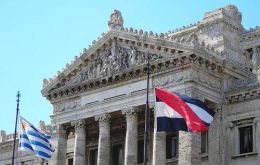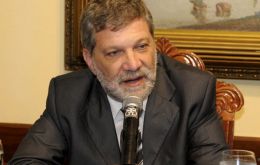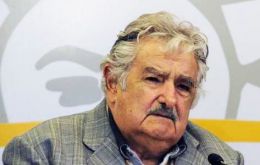MercoPress. South Atlantic News Agency
Tag: Uruguay
-
Wednesday, April 3rd 2013 - 06:57 UTC
Uruguayan Senate approves by a clear majority same-sex marriage

The Uruguayan Senate voted overwhelmingly, 23-8, in favor of a same-sex marriage measure Tuesday, which now must return to the Lower House before it is finally approved and signed by President Jose Mujica who has indicated he supports the measure.
-
Wednesday, April 3rd 2013 - 03:03 UTC
Falkland Islands’ referendum blasted by the Argentine embassy in Montevideo media

In full half page white and blue ads the Argentine embassy in Montevideo expressed on Tuesday how grateful it is to Uruguay for its support in the Malvinas Islands claim and for having been one of the first countries to reject the ‘legitimacy and publicity stunt’ of the ‘pseudo-referendum’ recently held in the Falklands.
-
Tuesday, April 2nd 2013 - 05:30 UTC
Uruguayan exports in first quarter down 13% compared to a year ago

Uruguayan exports of goods in March continued falling thus closing a discouraging first quarter, according to Uruguay XXI, the country’s agency responsible for promoting trade and investment in the country.
-
Tuesday, April 2nd 2013 - 02:42 UTC
Uruguay will go ahead with the re-gasification plant “with or without Argentina”

President Jose Mujica confirmed that the project for the construction of a liquid gas re-gasification plant in the River Plate coast, originally planned with Argentina, “will go ahead with of without the Argentine government”.
-
Thursday, March 28th 2013 - 10:15 UTC
Falklands’ sovereignty belongs to the ‘whole of Latinamerica’ says Uruguay

Foreign minister Luis Almagro said on Wednesday that Malvinas Islands’ sovereignty belongs to the whole of Latinamerica and as part of Latinamerica and the Caribbean, “we will defend the territorial integrity of the continent”.
-
Thursday, March 28th 2013 - 10:03 UTC
Uruguay 2012 GDP expanded 3.9% boosted by construction and domestic demand

Uruguay’s GDP expanded 3.9% last in 2012 over the previous year despite a slight contraction in the fourth quarter, according to a late Wednesday release from the Central bank. The bank’s original estimate was 4%. In 2011 the economy grew a revised 6.5%.
-
Wednesday, March 27th 2013 - 07:57 UTC
Francis scheduled to visit Argentina, Chile and Uruguay next December

Pope Francis is scheduled to make his first official visit to Argentina, where he was born, next December ‘to be close to his fellow compatriots’, according to ecclesiastic sources in Buenos Aires. The visit in the first half of December could extend to neighbouring Uruguay and Chile.
-
Sunday, March 24th 2013 - 03:11 UTC
Uruguay leaves benchmark rate unchanged; fears of slower economy and too strong Peso

Uruguay’s central bank surprised the market by keeping on hold the benchmark interest rate at 9.25% after increases at the two previous monetary policy meetings failed to slow inflation, one of the country’s main concerns.
-
Saturday, March 23rd 2013 - 10:25 UTC
‘Justice or democracy’, Uruguay’s dilemma according to The Economist

The Economist in its latest edition publishes a piece on Uruguay in which it reveals accurately the dilemma facing the country as a consequence of the legacy of the military dictatorship, 1973/1984 with all the killings, disappeared and tortured.
-
Friday, March 22nd 2013 - 21:23 UTC
Uruguay’s economic-trade relations with Argentina at ‘their worst moment in a long time’

The economic-trade relations with Argentina are going through ‘their worst moment in a long time’, and the latest measures announced by the government of President Cristina Fernandez have a ‘very harmful effect’ on Uruguay, said Vice-president Danilo Astori on Friday.
